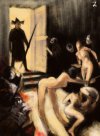Praefectus Praetorio
R.I.P. Brother of the Quill
The Governor begins his speech
“Cives Narbonis (citizens of Narbo),” said the Governor in a strong voice that carried throughout the space. “You see before you, one Barbaria, serva, a Goth from the tribe encamped north of here.” A few catcalls came out, but were silenced when Gaius raised his hand. “I should tell you that her father, Fritigernus, rex of that tribe, is here,” he gestured to the Goth leader in the box. “He has come to beg the commutation of his child’s sentence.” Again a few cat-calls, that were again silenced by the Praeses. “I am determined to give fair consideration to his request and make every effort to maintain goods relations cum nostris indocilibus accolis (with our barbarian neighbors).” Here there was more favorable murmuring as the crowd appreciated the need to keep peace with this fierce tribesmen.
Antonious had assumed that his indirect Latin would go over Friþugairns’ head, but when he turned to smile at the headman, he saw a disapproving frown.
Slightly taken aback and stumbling for a moment, the Governor swiftly regained his aplomb and again addressed the crowd. “Out of regard for the sensitivities of you, my friends, I have decided to explain to all of you openly, the reasons for showing mercy.” At this the crowd settled down, obviously willing to at least listen to their respected Praeses.
“Let me briefly review the legal case. Yesterday morning, this serva was bought for personal use (a few snide chuckles could be heard) by an officer of the government, meo filio” (even more chuckles. But the Governor pressed on.) “Shortly after her purchase, she attacked Galarius with possible lethal intent.”
“Damn bitch tried to kill me,” chirped up the lad in a high voice somewhat muffled by the large piece of sow’s udder in his mouth. Gaius looked sternly at his son, who quieted down and instead took a big gulp of wine.
“Quaestor Piso was present.” Here, the Praeses turned to Lucius who stood to take a modest bow to modest applause. “There were numerous citizens present and they all did agree that the girl was guilty of the two charges, lex maiestatis (treason – attacking an agent of the state) and parricidium (parricide – the attempted murder of a master).” As you all know, Quaestor Piso believes in using the full punitive power of the law” (a number of obscure and obscene expressions were mumbled). “Therefore he sentenced serva Barbaria to Poena Cullei, multa strupra, Flagellato, et Crucifixio!” Gasps resounded throughout the arena as the people realized for the first time the extremity of the punishment that had been decreed.
“Cives Narbonis (citizens of Narbo),” said the Governor in a strong voice that carried throughout the space. “You see before you, one Barbaria, serva, a Goth from the tribe encamped north of here.” A few catcalls came out, but were silenced when Gaius raised his hand. “I should tell you that her father, Fritigernus, rex of that tribe, is here,” he gestured to the Goth leader in the box. “He has come to beg the commutation of his child’s sentence.” Again a few cat-calls, that were again silenced by the Praeses. “I am determined to give fair consideration to his request and make every effort to maintain goods relations cum nostris indocilibus accolis (with our barbarian neighbors).” Here there was more favorable murmuring as the crowd appreciated the need to keep peace with this fierce tribesmen.
Antonious had assumed that his indirect Latin would go over Friþugairns’ head, but when he turned to smile at the headman, he saw a disapproving frown.
Slightly taken aback and stumbling for a moment, the Governor swiftly regained his aplomb and again addressed the crowd. “Out of regard for the sensitivities of you, my friends, I have decided to explain to all of you openly, the reasons for showing mercy.” At this the crowd settled down, obviously willing to at least listen to their respected Praeses.
“Let me briefly review the legal case. Yesterday morning, this serva was bought for personal use (a few snide chuckles could be heard) by an officer of the government, meo filio” (even more chuckles. But the Governor pressed on.) “Shortly after her purchase, she attacked Galarius with possible lethal intent.”
“Damn bitch tried to kill me,” chirped up the lad in a high voice somewhat muffled by the large piece of sow’s udder in his mouth. Gaius looked sternly at his son, who quieted down and instead took a big gulp of wine.
“Quaestor Piso was present.” Here, the Praeses turned to Lucius who stood to take a modest bow to modest applause. “There were numerous citizens present and they all did agree that the girl was guilty of the two charges, lex maiestatis (treason – attacking an agent of the state) and parricidium (parricide – the attempted murder of a master).” As you all know, Quaestor Piso believes in using the full punitive power of the law” (a number of obscure and obscene expressions were mumbled). “Therefore he sentenced serva Barbaria to Poena Cullei, multa strupra, Flagellato, et Crucifixio!” Gasps resounded throughout the arena as the people realized for the first time the extremity of the punishment that had been decreed.















